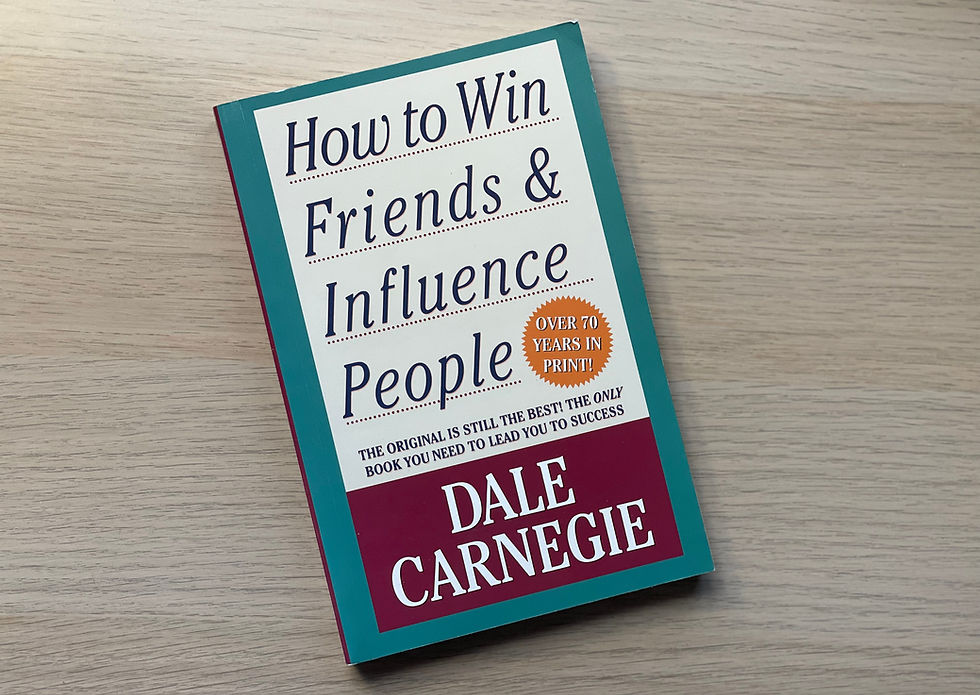A Student’s Guide on How to Win Friends and Influence People
- Profectus Education
- Nov 7, 2024
- 7 min read
Updated: Nov 22, 2024
We take a deeper look into every idea Dale Carnegie shares in his bestseller book How to Win Friends and Influence People, so you don’t have to. Here's the best way to learn people skills.

Written in 1936, Dale Carnegie's How to Win Friends and Influence People is an international bestseller and a timeless classic that teaches many lessons about anything people.
Introduction
“Dealing with people is probably the biggest problem you face.” It is precisely this insurmountable challenge both introverts and extroverts face that Dave Carnegie’s book remains a bestseller, as the book has been passed from person to person for over 70 years.
You might have just started to realise how important dealing with people is, or you might have been dealing with people regularly, but there is definitely still something to learn from Carnegie’s book. Read on for our comprehensive guide on the best ways to interact with people, empowering you to confidently navigate interpersonal relations. Here's a deeper look into Carnegie's best quotes in his book, along with our analysis on how you can act on his advice.
Criticism and Praise – how we respond to others
“When dealing with people, let us remember we are not dealing with creatures of logic. We are dealing with creatures of emotion, creatures bristling with prejudices and motivated by pride and vanity.”
If you feel the urge to criticise others’ mistakes to prove your point or to get them to make changes, think again. As Carnegie says, we are ultimately creatures of emotion, and our reactions can sometimes be instinctive and natural. From experiences with parents and overly critical teachers, I’m sure we all hate the feeling of being wrong, scolded for our mistakes and having to endure the flurry of emotions thrown against us. Most people feel pride in what they do, and if you criticise them, they will treat you as an enemy, and get defensive. If this happens, don’t ever expect to get them on your side again, and you’ll lose a connection who can help you out when you need it.
What we can do:
Feeling emotions like anger and frustration is a normal human response, but you need to be aware of showing it to others.
Take a step back when you’re feeling these emotions and evaluate whether they’re the best form of action if you want to build a permanent relationship with the person, or if you will be interacting with the person in the future.
Try to forgive and move on rather than land yourself in a confrontation. It’s simply not worth it.
“Yet I know, as you know, people who would think they had committed a crime if they let their families or employees go for six days without food; but they will let them go for six days, and six weeks, and sometimes sixty years without giving them the hearty appreciation that they crave almost as much as they crave food.”
Appreciation and praise are some of the best gifts one can receive, as they are recognised for their hard work and they feel of value to others. What’s even better about appreciation and praise is that they can be given completely for free and can go a long way in your relationships with others. When Carnegie talks about appreciation and praise, he doesn’t mean flattery – you don’t need to praise someone just to get on their good side, and even if you do so they can easily feel your insincerity. Don’t force yourself to praise others, simply speak your mind, as any praise will be well received if you mean it.
What we can do:
Pay attention to what others do, and be more generous with your recognition and efforts, even for small things that you appreciate.
Don’t be afraid to compliment others, and it shouldn’t be seen as something embarrassing but rather a way for you to recognise them for their efforts, hence improving your relationship with them.

Happiness and frustration might be two different emotions, but they are emotions that people experience daily in response to others' actions. By being aware of your emotions and that of others, you can better win friends and influence people.
Conversations – building strong connections through words
“Exclusive attention to the person who is speaking to you is very important. Nothing is so flattering as that.”
People speak to be listened to. What makes a conversation so magical is how two people are focused on each other’s stories, and engage in a back-and-forth discussion. A conversation can be stressful – you might not know how to continue it and might worry about what to say next – but that’s not what’s important. Ultimately, genuinely listening to the person you’re talking to and devoting your 100% matters most, as it is not your reply but your attitude that makes the speaker feel appreciated and respected.
What we can do:
Remove all distractions when in a conversation, do not look at your mobile phone or look around your surroundings unless necessary. Even when you take notes, try to use a notebook, and if that’s not available, let the speaker know that you are taking notes.
Don’t always focus on what to say next. Pausing after a person’s sharing to think before sharing your response is perfectly acceptable– sometimes it can even show respect when you’re actively processing what is shared.
“To be interesting, be interested. Ask questions that other persons will enjoy answering. Encourage them to talk about themselves and their accomplishments.”
Everyone has conversation topics of interest – be it about recent political developments, a new hobby or even where best to eat for lunch. Every conversation should be personalised according to the person you are talking to, and you should always try to find a common topic both of you are interested in.
What we can do:
When talking to someone for the first time, ask open-ended and diverse questions to search for common topics of interest, or at least topics of which both of you are aware to sustain the conversation.
For people/guests you are meeting beforehand, do some research into their background and their interests – this not only shows respect but can really help you out in a casual conversation with them.
It is simple to tell when someone is getting bored of a conversation, and if you see the person losing focus or attention, change the topic to a new one to keep the conversation going.

Learn that conversations are not about you, they are about the other person you're speaking to. If you understand this principle, you will have more meaningful conversations and lasting relationships.
Winning People Over – the art of persuasion
“Once having said a thing, you feel you must stick to it. Hence it is of the very greatest importance that a person be started in the affirmative direction”
The word “yes” is compelling. It emphasises that both of you are on the same side, working together to solve something and are not against one another. When someone says yes to a question or statement, he is likely to agree to the next idea you propose, and this psychological technique can allow you to build traction to get what you want. Be subtle in reaching an agreement, and soon, even someone against your idea would find it hard to say “no” to you.
What we can do:
Before asking controversial questions that can get into “no” confrontations, try confirming facts or finding areas you can agree with to reach “yes” answers
Do not be unreasonable in your asks. Use questions and statements to find out more about the person’s situation, so others can reciprocate by agreeing reasonably with your conclusion.
“The one major factor that motivates people was the work itself. If the work was exciting and interesting, the worker looked forward to doing it and was motivated to do a good job.”
Managing a team project is not easy, but convincing others to spend more time and effort on their work is even harder. It’s not uncommon for you to get stuck when someone in the group does not pull their weight, but you may be able to win them over through the way you present their work. By employing tactics in the art of persuasion, you can convince your teammates that the work they are doing is worth it and that they should work even harder to further elevate the project to greater heights, When you master these strategies, winning people over happens easily.
What we can do:
Appeal to a noble or meaningful cause or goal. People sometimes lose motivation because they don’t see a purpose in what they are doing. By showing that they are making an impact, they may be more likely to put in their time and effort.
Dramatise your ideas by using delivery and presentation skills meant to excite your groupmates, giving them an adrenaline boost as they begin to look forward to completing the project.
As a last resort, create challenges to stimulate competition, appealing to everyone’s drive to excel and emerge as the best. This could create a burst of energy that pushes people to work on the project.

To maximise your impact, you will need a team. For your team to be effective, you need them to be committed and on the same page.
Moving Forward
Dale Carnegie’s book gives a good collection of tried and tested tips and tricks to win over and influence people. However, while his list of steps to take sounds easy and mechanical, the application of his suggestions in reality is far from simple. However, don’t be discouraged as practice is the first step to achieving perfection – do experiment with these techniques in the various projects you embark on in your journey.
To summarise the book, there are many ways of winning friends and influencing people, but they all stem from one principle – thinking deeply about your words and actions and how they affect others. By being deliberate and intentional in how you do things, you will already be on track for success in becoming a confident and likeable leader.
For more exciting content on how to best take charge of your future, follow us on our Instagram

Comments